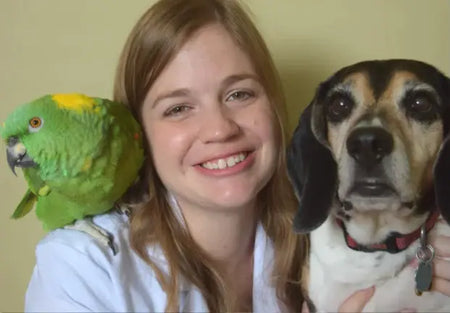In This Article
Summer fun is just around the corner which means traveling, cookouts, celebrations, holidays, and more. Perhaps you are going on a trip and plan to board your pet, or maybe you're having a get-together at your house for the fourth of July. The increase in activity and disruption of regular routines may cause some stress to the animals in our lives.
“Stress is defined as a disruption in homeostasis that elicits an adaptive physiological and behavioral response to restore” (1). Every person and animal experiences stress in life but not all stress is bad. Stressors can derive from physical, social, and/or environmental causes. In the veterinary setting, we see patients with separation anxiety, thunderstorm/noise phobia, and travel phobias to name a few. While these examples may not evoke a strong stress response for humans, they can certainly impact our pets.

Change = Stress
The summer months are a busy time filled with activities like fireworks, vacations, and traveling (by car, train, or plane), all of which can elicit stress in animals not well adapted to it. Some clinical signs associated with stress include hiding and self-isolation, over-grooming, urinating outside of the litter box, pacing and panting, changes in appetite, and gastrointestinal issues. In veterinary medicine, we use a variety of different methods to attempt to manage stress in our patients. Establishing a routine and allowing our pets to have a “safe” space in the house to retreat to can be helpful. Depending on the situation, anxiety medications and some natural supplements are the best options for helping to reduce anxiety and promote calmness. For chronic situations, it can be beneficial to consult with a trainer to develop a behavioral modification plan for the desensitization of certain triggers.
The Gut Brain Axis
Did you know there is research growing in the field of gastrointestinal health which is finding that stress can modulate the microbiome?

The gut-brain axis, while not well understood, is bi-directional communication between the nervous, endocrine, and immune systems. Research supports evidence that the microbiota is a key component in this axis and can also affect stress responses in animals. Stress can modulate the microbiome community, contribute to dysbiosis, and cause stress-related behaviors such as anxiety and depression (2). A study in mice examined the effects of psychological distress on the microbiota by exposing the mice to chronic social defeat stress which caused a change in behavior, a reduction in the richness of the microbiome, and alterations to the nervous and immune systems (3)
There are several studies examining the benefits of supplements such as omega fatty acids, prebiotics, and probiotics on the gut-brain axis. A study in rats revealed that supplementation with the probiotic Lactobacillus helveticus N58 reduced levels of the stress hormone corticosterone and improved stress-associated behaviors (2). A recent pilot study assessed the effects of a nutraceutical supplement which included probiotics, prebiotics, natural anti-inflammatories, and L-theanine administered to dogs who displayed anxiety and stress-related behaviors. While it was a small study, it determined that the microbiome of the healthy control group and treatment group were significantly different at the beginning of the trial. While diet was not taken into consideration in this study, this finding does raise the question of whether the treatment group, the stress and anxiety group, had a different microbiota makeup due to the levels of stress. Dogs that received the supplement experienced changes in their microbiome compared to the control group as well as a reduction in stress-induced behaviors at the end of the trial.
While we prepare for all of the fun that summertime holds, we should also consider our pets and how the increased activity and events may affect them. Perhaps supplementation with a probiotic may benefit their overall gastrointestinal and immune health as well as their ability to adapt to stressors.
Sources
- Karl, J. Philip, et al. “Effects of Psychological, Environmental and Physical Stressors on the Gut Microbiota.” Frontiers in Microbiology, vol. 9, 2018, doi:10.3389/fmicb.2018.02013.
- Foster, Jane A., et al. “Stress & the Gut-Brain Axis: Regulation by the Microbiome.” Neurobiology of Stress, vol. 7, 2017, pp. 124–36. PubMed, doi:10.1016/j.ynstr.2017.03.001
- Bharwani, Aadil, et al. “Structural & Functional Consequences of Chronic Psychosocial Stress on the Microbiome & Host.” Psychoneuroendocrinology, vol. 63, 2016, pp. 217–27. Science Direct, www.sciencedirect.com/science/article/abs/pii/S0306453015009348.
- Cannas, Simona, et al. “Effect of a Novel Nutraceutical Supplement (Relaxigen Pet Dog) on the Fecal Microbiome and Stress-Related Behaviors in Dogs: A Pilot Study.” Journal of Veterinary Behavior, vol. 42, 2021, pp. 37–47., doi:10.1016/j.jveb.2020.09.002


